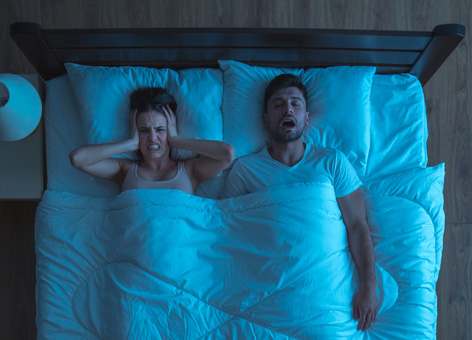
Snoring through a long winter’s night? It might be sleep apnea. ENT specialist Gerard O’Halloran, MD – board-certified in sleep medicine – explains how sleep apnea is diagnosed and treated.
What is sleep apnea?
Sleep apnea is a common disorder with one or more pauses in breathing or shallow breaths while you sleep. It affects about 20 million adults in the U.S., and many don’t realize that they have it.
When you fall asleep, your throat muscles relax and your tongue can fall back into your throat, blocking your airway partially. When you fall into deep sleep, it can block your airway completely, and you stop breathing. In order to get enough muscle tone to breathe again, you’ll move out of deep sleep into lighter sleep, which interrupts your sleep. This can happen 30 times or more per hour.
What are the health risks of sleep apnea?
Sleep apnea can aggravate high blood pressure and lead to heart attack or stroke. In fact, people with untreated sleep apnea have three to five times as many heart attacks and strokes as the general population. Sleep apnea can also contribute to depression, anxiety, Alzheimer’s, and even car accidents caused by sleepy drivers.
What are the signs of apnea?
Loud snoring is a classic symptom of sleep apnea. So is high blood pressure, and neck size, 17 inches or more (think of your dress shirt measurements).
Other signs: Are you tired during the day? Do you have a midafternoon lull when you could nap easily? Do you fall asleep very quickly at night? We also look at anatomy: If the tongue sits farther back in the throat or the lower jaw is shorter, that increases your risk for sleep apnea.
Sleep apnea runs in families. If family members have been diagnosed with sleep apnea, it may be useful for you to look into it, too.
How do you diagnose sleep apnea?
With a sleep study. This can be done at home: We give you a monitor with a chest strap and headband to wear overnight, to track your breathing and eye movement throughout the night. That data shows us if you have obstructive sleep apnea, and how severe it is. Home sleep tests must be ordered by a physician who is board certified in Sleep Medicine.
We also can do a more complex sleep study in the hospital for patients who have certain conditions. At the Sleep Center, a sleep study technician arranges sensors to monitor heart rate, oxygen levels and eye movement while you sleep, then monitors you from a workstation outside the hotel-like sleep suite.
With both tests, we count how many times you quit breathing or move out of deep sleep. Five to 15 events per hour is considered mild sleep apnea; 15 to 30 events are moderate apnea, and more than 30 is severe sleep apnea. I’ve seen patients up well over 100 events an hour.
What are treatment options for apnea?
There are three avenues for treatment: CPAP, dental appliance, or surgery.
CPAP (continuous positive airway pressure) machines use mild air pressure through a nasal tube or face mask to keep the airways open. It’s reliable, but 25% to 30% of patients can’t tolerate it. CPAP machines require a prescription.
Dental appliance therapy uses a custom-made appliance that fits like a sports mouth guard to hold the lower jaw and tongue in a forward position to help keep the airway open. It’s much easier to use than a CPAP machine because it’s just like putting in a mouth guard at night.
CPAP and dental appliances are long-term solutions that require long-term monitoring as well.
Surgery may help people with mild sleep apnea if it’s caused by big tonsils, excessive tissue in the palate, or a nose that needs straightening. Because surgery is a big undertaking, it’s generally the last choice of treatment for sleep apnea.
If I think I have apnea, what’s my first step?
Get a sleep study. Ask your primary care provider or an ENT specialist if a sleep study is appropriate for you. (You’ll need a referral for the test.)
It’s wise to do a sleep study relatively early in the calendar year so you have time to try different treatment options if necessary. It’s better not to feel rushed through the process, especially if you’re concerned about making the most of your insurance deductible.
**
Learn about Sleep Apnea and the Sleep Center.
Make an appointment with Dr. O’Halloran: (952) 469-0500
